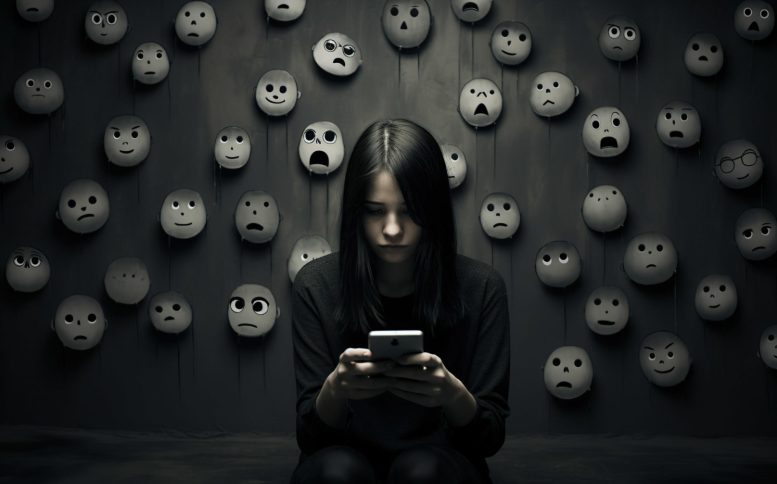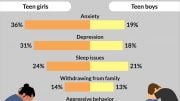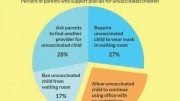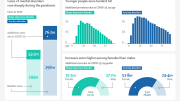
Although youth depression has risen alongside increased social media usage, a study from the Norwegian University of Science and Technology found no direct correlation between the two. The study followed 800 children over six years, examining their social media habits and mental health symptoms, ultimately concluding that increased social media use did not lead to more symptoms of anxiety or depression.
While children spend significant time on social media and there has been a rise in youth depression, there is no definitive proof that the two are directly connected.
Many children and young adults frequently use social media platforms like Instagram, Snapchat, and TikTok, often raising concerns among their parents and guardians. NTNU researchers have recently delved into understanding the effects of such media usage on the mental well-being of the youth.
“The prevalence of anxiety and depression has increased. As has the use of social media. Many people therefore believe that there has to be a correlation,” says Silje Steinsbekk, a professor at the Norwegian University of Science and Technology’s (NTNU) Department of Psychology.
But that is not the case if we are to believe the results of the study “Social media behaviors and symptoms of anxiety and depression. A four-wave cohort study from age 10-16 years”.
Trondheim Early Secure Study
In the Trondheim Early Secure Study research project, researchers followed 800 children in Trondheim over a six-year period in order to look for correlations between the use of social media and the development of symptoms of mental illness.
“We have collected data every other year, from the year in which the children were ten years old until they turned 16 years of age. This enabled us to follow the children during the transition from childhood to adolescence. Symptoms of anxiety and depression have been identified through diagnostic interviews with both the children and their parents,” Steinsbekk explains.
The outcome of the study was the same for both boys and girls. The results were the same regardless of whether the children published posts and pictures via their own social media pages or whether they liked and commented on posts published by others.
Increased use of social media did not lead to more symptoms of anxiety and depression. Nor was it the case that those who developed more symptoms of anxiety and depression over time changed their social media habits.
Norwegian researchers find weak correlations
A number of studies have been conducted in recent years looking at the correlation between the use of social media on the part of children and young people and their mental health.
Some studies have found that the use of social media promotes mental health, while others find that it has a negative impact. However, the majority of the correlations are weak, according to Steinsbekk.
“Mental health is often broadly defined in the studies and covers everything from self-esteem to depression. Data is often collected using questionnaires. It is unclear what has actually been measured and the focus has often been on frequency, i.e. how much time young people have spent on social media,” Steinsbekk said
“By following the same subjects over a number of years, recording symptoms of mental illness through in-depth interviews, and examining various types of social media use, our study has enabled us to take a more detailed look and provide a more nuanced picture of the correlations,” Steinsbekk said.
Previous studies conducted by the same research group show that around five percent of young people in Norway experience depression. The prevalence is lower in children.
One in ten children meets the criteria for an anxiety disorder at least once during the period between the ages of four and 14 years.
“Young people’s use of social media is a topic that often creates strong emotions, and there is a lot of concern among both parents and professionals,” she said.
“We are hoping to contribute more knowledge about how social media affects young people’s development and ability to function in society. Who is particularly vulnerable? Who benefits from social media? Does the way in which social media is used matter?,” she said.
Social support and less loneliness
Steinsbekk and her colleagues previously found that girls who like and comment on other people’s posts on social media develop a poorer body image over time, but this was not the case for boys. Posting to their own social media accounts had no impact on self-esteem, for both boys or girls.
Over the coming years, researchers will also examine how different experiences on social media, such as cyberbullying and posting nude pictures, affect young people’s development and functioning in society.
“Our study finds that if Kari or Knut increasingly like and post on Instagram or Snapchat, they are no more likely to develop symptoms of anxiety and depression. But that does not mean that they are not having negative experiences on social media, or feeling addicted or excluded. Some may be particularly vulnerable and those are the ones we need to identify,” Steinsbekk says.
At the same time, Steinsbekk also notes that there are positive aspects of social media.
“Social media provides a venue for community and belonging, making it easy to stay in touch with friends and family. Social media can be a platform for social support and help protect against loneliness for young people with few friends.
The Trondheim Early Secure Study has collected data from thousands of children and their parents every year since the subjects were four years of age. The subjects are now 20 years old and the ninth data collection round will take place this autumn.
Reference: “Social media behaviors and symptoms of anxiety and depression. A four-wave cohort study from age 10–16 years.” by Silje Steinsbekk, Jacqueline Nesi and Lars Wichstrøm, 1 July 2023, Computers in Human Behavior.
DOI: 10.1016/j.chb.2023.107859









“The prevalence of anxiety and depression has increased. As has the use of social media. Many people therefore believe that there has to be a correlation,”
There is, by definition, a correlation. The question is whether it is a “spurious correlation.”
Major purveyors of so-called news aren’t helping the disposition of adults by presenting OpEds and Letters to the Editor, along with biased reporting, and then censoring comments that point out the biases or misinformation. While Yahoo piously claims that it doesn’t censor comments, I have had numerous comments rejected, despite being civil and based on verifiable statistics. The only thing that the “failed to publish” comments have in common is questioning the ‘facts’ or conclusions of the articles being commented on. Frustration with ‘news’ outlets wielding raw power can lead to depression.
For example, comments commonly run 10:1 against articles promoting gun control. Yet, those deciding on what to publish continue to publish just the one side of the issue and reject or suspend comments that they don’t approve of if the commenter uses words with more than two syllables. News goes stale very quickly today, and most ‘news’ outlets close commenting after 3 days, if not sooner. Thus, a comment suspended for review effectively becomes banned. “Justice delayed is justice denied.” Who wouldn’t be depressed if they care?